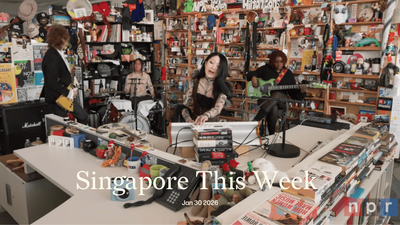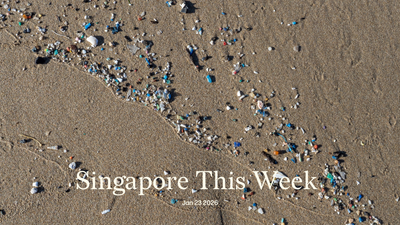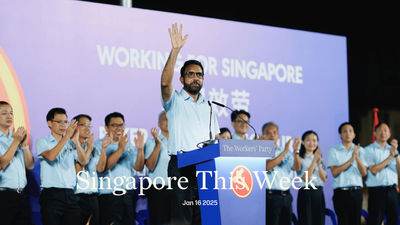Society: ‘I felt very dirty…very used’
She would wake up feeling groggy, unable to recall anything. Initially, she thought the drowsiness was due to the pills that her then-husband had given her when she felt unwell. On a few occasions, she found herself without underwear on and with no memory of having removed them: “I thought he could have done it when I was asleep,” said Annie (not her real name), recounting her horrific story last week for the first time to The Straits Times (ST). The “he” was J, a man she loved and trusted, the father to their four children—and also the mastermind who turned a gross fantasy shared among other husbands he met online into sordid reality.
Annie’s is a sickening tale of subterfuge and cunning. About an instigator who drugged his wife and invited strangers to rape her—five men over eight years—while he sometimes watched and recorded. Annie wasn’t the only victim. Three women, whose husbands had raped her, were similarly violated, two by J. It’s been more than five years since Annie discovered J’s betrayal through a trail of evidence left on his phone, and reported it to the police. The conspirators have been sentenced, with J receiving the heaviest punishment: 29 years’ jail and 24 strokes of the cane.
“I was initially a bit worried about speaking up, because I am not sure if I can face the embarrassment,” she told ST. But she wanted women to know “this kind of thing really happens”. Gisèle Pelicot inspired her. The 72-year-old French woman had found out in 2020 that her now ex-husband had sedated her for over a decade, allowing more than 50 men to rape her. Pelicot has become a beacon of courage for waiving anonymity in her mass rape trial and shifting the shame back on to the accused. The trial also ignited conversations around marital rape, consent and chemical submission.
Annie sharing her experience may offer other sexual assault survivors a way to understand and deal with their own trauma. But the work to end sexual violence continues. Marital rape, to be clear, is rape, even without drugs or conspirators. Corinna Lim, executive director of AWARE, a gender equality advocacy group, wrote, “There is hope at the end of the tunnel…not just for survivors…but society as a whole.” This case, Lim argued, provides a textbook example of toxic masculinity and the “manosphere” deserves our full concern. If we can “identify” sexual violence, she said, we can “call it out and fight it together.”
Some further reading: In “Consent, trauma, and healing: a survivor’s (messy) story”, Cherry Tan bravely details her own experiences, and offers us all a useful primer on the notion of consent.
Society: Girl, it’s so confusing sometimes
The stress and possible depression associated with girlhood and teenagehood in the developed world is captured by Charli XCX and Lorde, Zendaya in “Euphoria”, Mitski, and other artists. But how is that base angst intensified by life in top Singaporean schools? We’ll soon find out. Researchers from the National Institute of Education (NIE) will study the behaviour of teenage girls and their increased susceptibility to stress and problematic behaviours. Jacqueline Lee Tilley, the study’s lead investigator, was inspired by a prior US study that found youths in high-achieving communities have a higher rate of substance use and depression compared to national norms. A smaller study of hers in Hong Kong found similar trends but with a gendered dimension: females showed higher rates of anxiety and depression than males. Tilley’s team aims to recruit 4,200 secondary students from three girls’s schools and one co-ed school (to assess some boys as comparison) for a three-year study, 2025-28.
We hope schools and society at large are ready to engage in a deeper, more sophisticated discussion on the issue. Critical feminist scholars have discussed the possible tension between socially constructed gender norms and the “culture of perfection” embedded within high-achieving schools. This can lead to an environment that pushes girls to meet ever-higher standards of academic achievement in addition to the pressures to conform to heteronormative femininity. Moreover, admissions to such prestigious schools are competitive and may be shaped by individual access to certain resources (such as tuition or familial connections) and this can affect how students keep up in school. In Elite Universities and the Making of Privilege: Exploring Race and Class in Global Educational Economies, a study found that racial minorities from poorer economic backgrounds have expressed similar experiences of “feeling they don’t belong in comparison to their wealthier white counterparts.” In a different journal article, the mental health of LGBTQ teenagers was significantly worse than heterosexual teenagers despite growing acceptance by their peers. One possible reason is that “teenagers are exploring this part of their identity while going through the broader identity turmoil that is part of adolescence.” It is thus important for the study to consider the various ways class, race, and sexuality might intersect in such competitive environments.
Some further reading: In this week’s essay, “Triaging the Singapore education system: the primary care of ‘Secondary: The Musical’”, Corrie Tan, Jom’s arts editor, reviews one of last year’s biggest hits, one that “really is a plea for an ethics of care to take root in the school system before primary care becomes palliative care.”
Business: I love you, you pay my rent
Beloved baker Flor Patisserie is closing after its landlord raised rents by 57 percent, and a general practitioner (GP) clinic secured a lot in a Tampines HDB estate with a monthly rental bid of S$52,188. These are simply two of the most prominent recent signs of a property market gone crazy. The latter exposed a divide in the ruling party. Ong Ye Kung, health minister, said he was “dismayed”, that the high rental bid would “translate to higher cost of healthcare one way or another”, and that future tenders should focus less on price and more on quality; while Ho Ching, the verbose former boss of Temasek, defended open tenders and the high bid, suggesting it might lead to improved services and would not necessarily spike patient costs.
Public discourse on the issue has thus far been constrained and mediated mostly by those outside the property sector. Until this week. Ervin Yeo, a senior executive at CapitaLand, published “Put down the pitchforks for a moment and hear me out: Perspectives on Singapore Retail” on LinkedIn, pitched as the personal perspective of a mall operator. Among other things, Yeo said that rents today are still significantly lower than pre-Covid levels; argued against rent controls; interrogated Flor’s reasoning; explained why vacancy taxes might not have any additional effect; bemoaned the “anti-mall” movement while cheering, as a Sengkang boy, suburban malls; and suggested that urban rejuvenation could be accelerated through policy shifts like greater use of Price x Quality (PQ) tender model and lowering of the Development Charge the government levies on developers. “[G]ood retail is 80% practical 理性 and 20% idealistic 理想,” he said, in a section that explained how retail diversity across the city can allow space for everybody from “fresh, experimental, niche concepts” to big brands.
Yeo acknowledged the elephant in the room, the cost of land, and said he “wonder[s] how sustainable it is for Singapore to be the safe haven of choice for some of the most populous countries in the world, like India, China, Indonesia.” His organisation’s vested interests notwithstanding, it’s refreshing to see a senior executive here lead such a frank and often humorous, meme-laced public discussion on a matter of public interest. He helps us peek behind the curtain to understand concepts like occupancy cost, and industry dynamics behind the flurry of hotpot restaurants. Hopefully other millennial honchos follow Yeo’s lead. The comments, from a diverse mix of small business owners, professors, Metro’s chief operating officer and Jeremy Tan—LinkedIn title: “Independent Candidate with best performance in GE2025 for 53 years”—are alone worth reading. Best of all, Yeo tells us where the yummiest new egg tarts in town are: at one of their malls, of course.
History Weekly by Faris Joraimi
Anthony Reid (1939-2025), historian of South-east Asia, died on Sunday. His contributions went beyond “great men of prowess” or the hard facts of trade and revenue: widely favoured topics of his predecessors. Reid wrote about spices, of course, and European merchants, but also women and the enslaved, royal musicians and masked dramas. He considered the religious traditions of Islam, Buddhism and Christianity to be real forces of social transformation in the region. Reid’s classic, Southeast Asia in the Age of Commerce, 1450-1680 asked what made “South-east Asia”—a geopolitical invention of world war two—a region at all. Taking a leaf from Fernand Braudel’s grand history of the Mediterranean, Age of Commerce considered South-east Asia an integrated area based on physical and human geography interacting with each other over a very long timespan (the longue-durée). Slow, deep time created South-east Asia’s rivers and seas, which in turn gave rise to particular human patterns of movement and interaction. Between the 15th and 17th centuries, this structure interacted with various global developments—expanding world trade, the spread of universal religions—to bring about an age of material abundance, cultural refinement, and political stability.
Reid had his critics. But the concept of a shared cultural world, without borders and national identities, remains timely. Among his institutional legacies is the Asia Research Institute (ARI) at NUS, of which he was the founding director. It has been a major space of support for countless scholars. Late in his academic career, the master tried his hand at fiction. Mataram, “a novel of love, faith and power in early Java”, told the story of an East India Company man who falls for his Javanese interpreter. As news spread of Reid’s passing, numerous tributes lauded both his rigour and friendship. Ahmad Humam Hamid, of Syiah Kuala University in Banda Aceh, Indonesia praised Reid as an impartial student of the past. On the once-great Aceh Sultanate, Reid painted no “pure paradise”, but “afforded equal curiosity to manuscript and Man, to moss-grown tombstones and decrepit old mosques, to singing in marketplaces and to dirty alleyways.” Annabel Gallop, head of the British Library’s South-east Asian collections, said he was “completely without any airs, and constantly probing.” For all our time-traveling, historians must inhabit our particular time, and one particular life. But it is far from lonely.
Arts: Ghostbusting dustbuster
She’s red and white, a sucker for cleanliness, and all set to get a family business back on track. No, she’s not Singapore. She’s an anthropomorphic vacuum cleaner and the breakout star of “A Useful Ghost”, the Thai-language film that just clinched the Grand Prix at Critics’ Week, which runs parallel to the Cannes Film Festival. In the morbidly delightful comedy-fantasy, the owner of a vacuum cleaner factory is bereft when his wife dies of dust poisoning from his own establishment. Until she’s reincarnated as a haunted hoover, that is. In a morally contentious twist, she decides she’ll help her tetchy in-laws out by expelling unruly spirits from the very factory that killed her, putting family duty over labour rights violations. It’s a complex, charming story with a complex, charming leading lady—who happens to have been designed by a Singaporean. Sim Hao Jie, award-winning product designer, was summoned by the film’s co-producer, Tan Si En, to conjure a cleaner that possessed the “surreal, character-driven qualities” of the film, but also “felt believable as an off-the-shelf product”. Sim, who otherwise has an illustrious career designing consumer appliances, was drawn to the whimsical plot. He put the character through a rigorous five-month design process, referencing nostalgic forms from the “soft electronics” retro design movement of the 1970s-90s alongside the bold geometries of the Memphis Art movement of the 1980s. “One subtle detail is its slightly forward-leaning posture, which reflects the main character’s subservient role in the story,” he told CNA.
“A Useful Ghost” is one of a clutch of recent films that aren’t made-in-Singapore but made-with-Singapore, with Singaporean producers combining the best of their financial and creative resources with regional networks and local storytelling. Other made-with-Singapore films that have made it big on the international film circuit this year include “Renoir”, about a young Japanese girl who retreats into her imagination to cope with her father’s illness and her mother’s overwork; and “Before the Sea Forgets”, where a Vietnamese man is also haunted, but this time by the spectre of his lover’s straying heart. Peek at the credits, and you’ll see Singaporean fingerprints all over, from the cinematography to the colour-grading. Momo Film Co, which co-produced “A Useful Ghost” with other Thai, French and German companies, has been one of the strongest advocates of this collaborative approach. Tan, also its founder, said in a press statement: “It [the award] shows the power that South-east Asian stories have to resonate globally.” The South-east Asian spirit isn’t just about the hantu in our households, but the semangat of our silver screens.
Tech: Growing Grab’s war chest and fleet
Singaporean superapp Grab is offering investors US$1.25bn (S$1.6bn) in convertible bonds, the largest by an Asian company since mid-2024. Convertible bonds are especially useful in times like these when companies have to pay high interest to borrow from banks. Bonds bring in low-cost capital without diluting equity. Investors, on the other hand, are assured of relatively low-risk returns: 0.5 percent in this case. Grab intends to use the money to fund acquisitions and share buybacks, signalling its transition from cash-burning startup to financially sophisticated market leader. This financial maneuvering comes alongside GrabCab’s July launch, which will see 40 hybrid taxis hit Singapore roads as part of a clever strategy to reactivate inactive drivers rather than poach from competitors. GrabCab’s asset-light approach offers S$1,000 safety bonuses to attract over 700 interested drivers, demonstrating how the company is leveraging its LTA license to address Singapore’s taxi supply crunch without the capital intensity of traditional operators.
The parallel moves reveal Grab’s multifaceted growth strategy. While the bond issuance strengthens its war chest for potential mergers & acquisitions and investor returns, the taxi venture deepens roots in its core transport business. Together, these initiatives showcase Grab’s evolution into a mature, diversified tech giant, though challenges remain in maintaining driver incentives and achieving sustainable profitability across its expanding empire. The coming months will test whether Grab can successfully balance financial engineering with operational execution in its quest for regional dominance.
Tech: Bob the Builder falls apart
With a simple promise to use AI to build apps for clients, Builder.ai became a celebrated unicorn backed by Microsoft, and Qatar’s sovereign wealth fund. Its impending bankruptcy serves as a cautionary tale about the perils of unchecked hype in AI investments. It also reveals how even well-capitalised startups—Builder.ai secured US$250m (S$321m) in funding just two years ago—can crumble suddenly.
The company’s dramatic downfall was triggered when creditor Viola Credit seized 90 percent of its cash reserves. Initial worries about padded sales figures have been compounded, the Financial Times reports, with suspicions that Builder.ai was “using a broader range of methods to inflate some of its revenues, including improperly booked discounts, tiny upfront deposits and seemingly circular transactions with key customers.” Binance Square, meanwhile, begun its exposé with a little cross-cultural jibe—“The Indian guys are really quite impressive!”—before alleging that the entire operation was a scam, with low-cost Indian programmers cosplaying as AI.
This implosion has particular significance for the tech eco-system in Singapore, where Builder.ai maintained operations and counted Jungle Ventures among its backers. While Builder.ai’s no-code app platform initially seemed promising, its inability to translate its valuation into financial stability demonstrates that even unicorn AI companies are not too big to fail. As the AI gold rush continues, this collapse may prompt more discerning investment approaches, particularly in South-east Asia where startups have access to cheap labour which could be used instead of real AI capabilities. The incident also raises questions about debt financing for tech startups, with Viola Credit’s aggressive cash seizure ultimately triggering Builder.ai’s demise despite its high-profile backers.
Faris Joraimi, Sakinah Safiee, Corrie Tan, Tsen-Waye Tay and Sudhir Vadaketh wrote this week’s edition. Additional contributions by Liyana Batrisyia and Abhishek Mehrotra.
If you enjoy Jom’s work, do get a paid subscription today to support independent journalism in Singapore.








